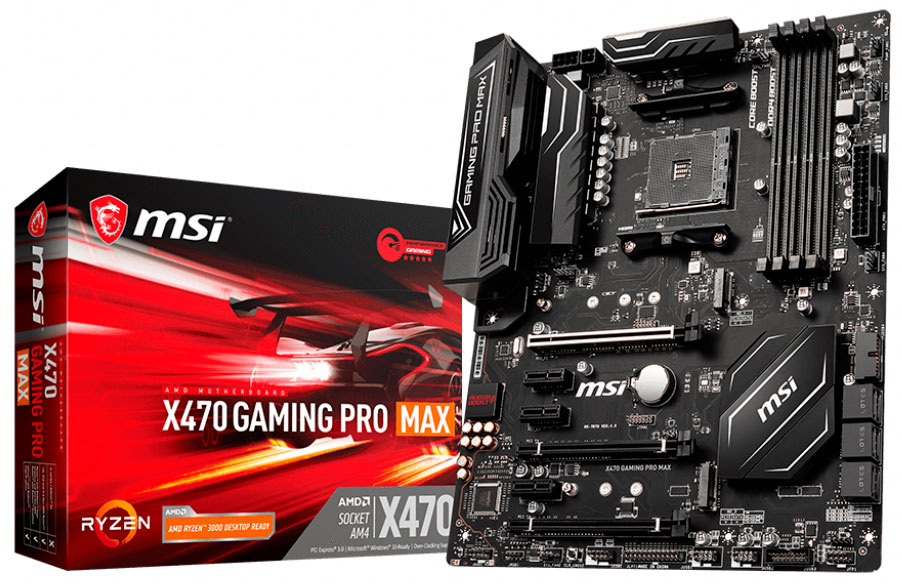MSI Brings Out-of-Box AMD Ryzen 3000 Support to 300, 400-Series Mobo Lineup
MSI has announced 10 revised AMD 300-and 400-series motherboards that come with support for AMD's Ryzen 3000-series processors right out of the box. You can tell these new boards from the original versions by their MAX suffix.
| Chipset | Motherboard |
| A320 | A320M-A PRO MAX |
| B450 | B450M-A PRO MAX |
| B450M PRO-VDH MAX | |
| B450 GAMING PLUS MAX | |
| B450M PRO-M2 MAX | |
| B450M MORTAR MAX | |
| B450 TOMAHAWK MAX | |
| B450-A PRO MAX | |
| X470 | X470 GAMING PRO MAX |
| X470 GAMING PLUS MAX |
Earlier this month, MSI started rolling out updated firmwares for numerous AMD 300-and 400-series motherboards so they could support the recently released Ryzen 3000-series CPUs. Many of the motherboards are using 16MB BIOS chips with limited capacity. Therefore, MSI made a few compromises, such as removing the eye candy from the BIOS interface while eliminating support for RAID arrays and A-series and Athlon Bristol Ridge APUs.
The MAX motherboards reportedly feature 32MB BIOS chips, so MSI was able to restore the snazzy "Click BIOS 5" interface and RAID functionality. However, they still lack support for Bristol Ridge chips, which shouldn't be a big deal since we doubt many will be pairing a three-year-old APU with one of these modern motherboards. MSI has also promised support for any future AMD processors.
And while the original motherboards officially housed DDR4 memory modules up to 3,466 MHz, the latest MAX motherboards can support memory speeds up to 4,133 MHz. As usual, the motherboards are equipped with MSI's DDR4 Boost technology, and you can configure your memory kit to run at its advertised speed with the A-XMP function.
Unfortunately, MSI didn't list the availability for the MAX motherboards. However, the motherboard manufacturer has already listed a few of them on its website, so we expect the motherboards to hit the market very soon. It's unclear if the MAX variants will be more expensive than their non-MAX counterparts.
Get Tom's Hardware's best news and in-depth reviews, straight to your inbox.

Zhiye Liu is a news editor, memory reviewer, and SSD tester at Tom’s Hardware. Although he loves everything that’s hardware, he has a soft spot for CPUs, GPUs, and RAM.
-
MJDouma Replyadmin said:MSI announced 10 revised AMD 300-and 400-series motherboards that support AMD Ryzen 3000-series CPUs out-of-the-box. They're branded with the suffix "MAX."
MSI Brings Out-of-Box AMD Ryzen 3000 Support to 300, 400-Series Mobo Lineup : Read more
Unfortunately, like all other pre-500 series motherboards, they will apparently not support PCIe gen4.
"This is an error we are correcting. Pre-X570 boards will not support PCIe Gen 4. There's no guarantee that older motherboards can reliably run the more stringent signaling requirements of Gen4, and we simply cannot have a mix of "yes, no, maybe" in the market for all the older motherboards. The potential for confusion is too high.
When final BIOSes are released for 3rd Gen Ryzen (AGESA 1000+), Gen4 will not be an option anymore. We wish we could've enabled this backwards, but the risk is too great."
Amd/comments/buydi6/_/epn2c83View: https://old.reddit.com/r/Amd/comments/buydi6/amds_robert_hallock_no_pcie_40_support_on_300_and/epn2c83/ -
TJ Hooker @MJDouma that may be the official stance from AMD, but a number of motherboard manufacturers have started enabling PCIe 4.0 on 400 series boards even after AMD made that statement.Reply
E.g.
https://www.tomshardware.com/news/biostar-pcie-4.0-x470-b450-motherboards,39978.htmlhttps://www.techpowerup.com/257380/asus-begins-enabling-limited-pcie-gen-4-0-on-amd-400-series-chipset-motherboards?amp -
Badelhas What about availability? When will we be able to really buy these Max versions?Reply
I am waiting for the MSI B450 Tomahawk MAX so I can upgrade my good old Intel i5 2500K @4.7Ghz to a brand new AMD Ryzen 5 3600...
Cheers
